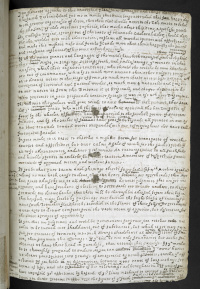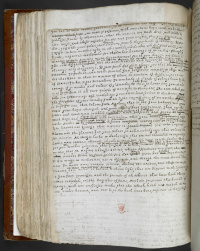Tilt Entertainment (?): Merlin and Pilgrims
Henry Howard (1597?)
N.B. The title used here is taken from Wiggins. The transcription in "Historical Records" is under construction.
Historical Records
Manuscript Fragment
Three fragments of dramatic royal entertainment survive in adjacent leaves among the papers of Lord Henry Howard, later Earl of Northampton, written in his hand (British Library, MS Cotton Titus C vi, fols. 203r–204v). While all three fragments appear to have been composed to be performed in the presence of Queen Elizabeth, it is unclear whether they constitute elements taken from the same entertainment or from two distinct entertainments. D.C. Andersson, who first announced the discovery of the fragments in 2008, proposed that they were from the same event. This entry follows Wiggins, who assumes that they represents two events: one, a tilt entertainment, and the other, a royal progress entertainment. (For the other entry, see "Royal Entertainment: Hermit and Nymphs".)
The following transcription reproduces the speech that appears on fol. 203r-v.
- [fol. 203r]
- Your gloriouse approche to this vnworthie place (faire Princesse and choise darlinge of the fairest Destinies) doth put me in minde, that haue longe attendid this
farhappie day with greater eagernesse of desire, then theie that dwelle neere to the Pole couete to beholde the Son, of old Merlines prophecie, that muche about this time, a spotlesse, peerlesse, endlesse virgine, sprunge out of the roote of renomede Cadwalader, should dazele the worldes eies with admiration, enflame all worthie spirites with affectione and make this mightie riche and fertile Ilande, more then thrice happie (by the sacred and incessant influence) of hir owne actiue happinesse[.] - [in margin: thou ingeniouse inuentions]
- If all the voices pennes and languages of the worlde, haue both exercised, and delightid their [owne] swete Muses, in singinge, settinge forth, and emblasoninge, your merites in that measure, which their capacitie conteines, whie should the Welshe by more abashed ore out of countenance, which is by so much more ancient then other vulgare tongues as it drawes neerer to the siege of Troie, so much more chaste as it is lesse pollutid with corruption of borrowid and painted wordes, so much more naturalle and propere to our nation as from the Britones it is Originall, and therfor deserues to be more preciouse in your profounde conceite, bycause it was in vse with your Progenitors.
- The Destinies themselues will giue winde to anie
honorableworthy instrument that soundes yourworthierenowmed praise, who with the keies of fortune opene all the brazen gates of force, by the wheeles offortuneprounance haue bene carried to the furdest pointe of soueraine felicitie, and by the sailes offortuneyour own fair destiny haue gone farre beyonde all princes in our tyme that trauaile toward Hortos Hesperides (which our cosmographeres doo nowe call) Fortunatas Insulas. - In your minde it is easie to obserue a mightie Ocean for transporte of worthie courses and affectiones, but euer calme, A gale of winde for the quicke speede of all wise aduenturores, and euer prosperouse An encouragement to all faithfulle and humble spirites to embarke, but vnder caution A warrante of respectiue fauore in rewarde of approued merite, and without satietie.
- If you be that pure sainte and shininge obiecte faire ladie (of which Merline speakes) (wherof no man hath cause to dout, that can heare,
beholdeadmire, ore apprehende) then Merline giues aduise by me, to alldeuotid pilgrimesdeuoute pilgrimes, that are yet in appetite, and haue freedome of election to sette saile ore to caste anchore, to steppe forwarde, ore drawe backe, that theie will be thoroughlie aduised, before theie begin this hopefull viage, leaste by pursuinge ouer hastilie the bright blasis of encouragement, (with Petrarkes flie) theie be scorchid in the flames of their follyes For presumption is euer apte to drawe comforte from the vaste ocean of appetite, but discresion from the sweet springes of opportunity[.] - If you that are pilgrimes, and wold be petitioneres for grace, can resolue
to benot onlie to be turned into shaddowes, out of substancis, but which is yet more painfull, for encrease of tormente, into such strange shaddowes asareagainst philosophy to be sensitiue of smarte, then frequente this offeringe. If your eies be not only fountaines but suche fountaines as haue their head in paradise, then attende this exercise. If your mindes be so thoroughly preparid to endure, as you canenduredispens[?] withper[unclear]tteyour owne hartes to drawe your spirites, into practise of conspiracie againstyour seluesitself, enrolle your affectiones[.] If you holdeitno disproportion betwene your vowes of languishinge for terme of life, and thepossibilitielikelyhod[?] that may[?] be gathered of his relentinge ad bene placitum â [in margin: âsubscribe your sincertitiesubscr...[illegible]] [.] If anie of you haue expressid your affectiones by hasarde of your liues in sekinge to improue your by [unclear] valewes before you durste presume to offer vppe the figure of your faith,persiste in your industiewith confidence[illegible]. If
- [fol. 203v]
- you can so much master yourselues, as to wonder at the <bright>nesse of y[e] obiect for a w[hile]
a large while, befor you vente your passiones, with vncertaine hopes, and make this goddesse, knowe by obseruation, that the wateres are most deepe, which make leaste noise, and those vesselles, for the most parte emptie, that giue greatist sowndes, perswade your selues, that franck[?] election, maie be the garlande of approuid constancy. If you professe to loue no other light, in this worlde, beside that which did first strik you blinde, enquire at wodstocke for that luckie hermitage of rare miracles. Though you chaunce to reele sometime vppon discouragement (so as you droppe not downe right into dispaire) or [unclear] to[unclear]swim with trowtes against the streame till a better season comebeleue, that the same vertewe doth appeere, as well by strengtheninge, as by staggeringe, If your faith doo still assure you that therayesbranches of soueraine perfection, can not be seuerid from the roote of sensitiue remorse (in those mindes that haue in them no mixture of alaie, no tincture of disdaine, no tainte of scorne) In hoc signo seruaberis To conclude if your ende of sekinge honor by the courage of your mindes, and valour of your swordes,beonlie haue bene to honor one, your studdie of perfection in all rare pointes of merite, be to serue one, The care which you take, in preseruinge and ennobelinge your own liues, be but to die for one,The fThe freedome of your mindes, from all light impressiones, of vnworthiesightes, be kept for one, then beleue from Merline, that, in that one your labores will proue easie your hopes cherefull and your conclusiones prosperouse Theas are the lawes and conditiones to whichso maniethe full consort of all those must subscribe and sweareashisbeginnrisolu[e] to beg[in] with hope andwold endedesire to conclude with happinesse. what yourvowes ore meritesaffections maye worke furderinby praier and fastingeperseuerancein futaro Tomorrowinuisiblecontingenteetper potestatum inuisible Merline knowes not bycause that misterie isignotum superisvix vrtum[?] superis[.] - Blame not the planetes, but your selues, in acknolwedginge that volenti non fit iniuria All thinges lurke in darknesse, that are not reuealid to capacity labor maie receaue rewarde, the skies maie fall, we maie catche larkes. But yet you worthie pilgrimes, [unclear interlineation] that persiste in action, retaine theas growndes in minde, that in magnis voluisse sat est, whear affections are pure, that
wandes[?]arrowes shotte by faire goddessis doooften[unclear] perce butnotseldome impostumate It is a winge to meditation, not to dispaire, and though the worst should chaunche In morte omni vacanto iniuria, dulcis est exitus, and those trewe seruantes, of most renowmed saintes can neuer be buried without light, that are blastid with lighteninge. - To you faire princesse and the fairest of all otheres that haue had theire names recordid in the Register of fame, Merline presentes this humble offeringe, with ane endlesse wishe, that she which hath no
tmatch in merite, vnder heauen, maie euer be, as she hath euer bene, superior in happiness.
Latin phrases used in the speech
- ad bene placitum: at one's pleasure
- in hoc signo servaberis: in this sign you will be served (cf. in hoc signo vinces: in this sign you will conquer)
- volenti non fit injuria: to a willing person, injury is not done
- in magnis et voluisse sat est: in mighty projects even to have wished is enough (Propertius, Elegies 2.10.5)
- in morte omni vacanto iniuria, dulcis est exitus: cf. Stanisław Warszewicki's Latin translation of Heliodorus' Aethiopica (Siquidem in morte vacante omni contumelia, dulcis est exitus: Since every insult vacates in death, the end is sweet)
Theatrical Provenance
Presumably intended for performance before Queen Elizabeth. Wiggins speculates the speeches may have been written for performance at the Accession Day tilt on 17 November 1597.
Probable Genre(s)
Masque (Andersson); tilt entertainment (Wiggins).
Possible Narrative and Dramatic Sources or Analogues
(Information welcome.)
References to the Play
None known. (Information welcome.)
Critical Commentary
Andersson, who discovered the speeches, first proposed Lord Henry Howard as the author and a composition date in the 1590s on the basis of paleographic evidence ("Embarke," 172-73). Andersson proposes that the first speech's counsel of restraint may have been directed at the Earl of Essex, comparable to Howard's advice for the earl in Durham University Library, Howard MS 2 (174-75).
Wiggins (#1087) suggests that the speeches may have been written for a tilt entertainment rather than a masque proper. If the speeches represent the author's attempt to regain royal favor, the occasion may have been the Accession Day tilt of 1597, at which three Howards participated after a period of disfavor.
For What It's Worth
Works Cited
Site created and maintained by Misha Teramura, University of Toronto; updated 18 June 2018.

